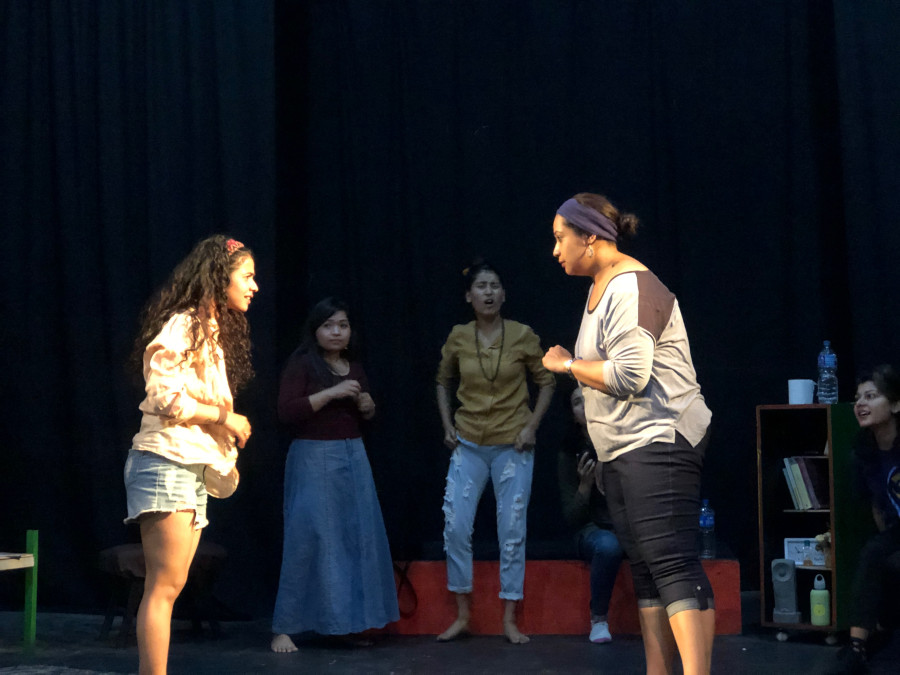Entertainment
New edition of Vagina Monologues tackles harassment and patriarchy on a personal level
Four years ago, when a group of female theatre artists began working on a Nepali adaptation of the landmark feminist play The Vagina Monologues, many, particularly men, were curious.
Tsering D Gurung
Four years ago, when a group of female theatre artists began working on a Nepali adaptation of the landmark feminist play The Vagina Monologues, many, particularly men, were curious.
‘Just what is it that you are doing behind closed doors,’ they asked those involved in the production.
“The men were not used to being left out,” said Akanchha Karki, who has acted in and directed multiple productions of the play in Kathmandu. “A lot of them, I think, were not able to grapple with the fact that women are capable of putting on shows without their involvement.”
Karki said she was quickly labelled a “radical feminist” by male colleagues for choosing to bring to the stage a play centred around celebrating female sexuality.
There were also attempts to sabotage the play, she said.
As she gets ready to showcase the fourth iteration of the play—Private is Political, Vagina Monologues 4.0—which premieres today, April 26, there’s a creeping sense of deja vu.
Because the play is being staged in the wake of the publication of news reports detailing sexual harassment allegations against three influential men in the industry—Rajkumar Pudasaini, Rajan Khatiwada, and Sunil Pokhrel. And Karki and her team have been accused of orchestrating the news story in order to generate publicity for the play.
“Since I have been very vocal about misogyny and sexism within Nepal’s theatre industry and have spoken against sexual harassment, people assume I had a role to play in the publication of the article,” said Karki, referring to the report published in Shukrabar weekly.
Some of the cast have also heard that there’s been calls for a boycott.
“One of my friends told me that he will not be coming to watch our show,” said Loonibha Tuladhar, one of the actors, as she got ready to rehearse. “They think we are engaging in politics and doing something wrong.”
Many in the industry seem to be worried because the play, unlike its previous iterations, is not primarily based on the original 1996 text by Eve Ensler. Instead, it tells personal stories of real women—including the actors themselves—and takes on issues of sexual harassment and patriarchy head on.
“I think people are just worried about the kind of stories that will be shared on stage,” said Tuladhar.
Karki and her co-writers have used the rehearsal room as a setting to talk about issues of harassment, victim shaming, consent, power dynamics and patriarchy in Nepali society.
Much of the play centres around conversations between the female actors who express anger, fear, rage at the growing number of incidents of violence against women in the country. As the play progresses, the women slowly begin to share their own stories of abuse, harassment and rape.
The scenes are largely based on real-life conversations that unfolded during workshops during previous editions of the show.
“During these meetings, women were sharing deeply personal stories, things that they hadn’t even told their closest friends,” said Karki.
While the experience of performing the original Vagina Monologues was liberating, Karki said she felt there was a certain disconnect between the roles they were portraying on stage and their realities off it. On stage, the women were embodying characters who could openly talk about sexuality, gender, and sexual violence, but offstage, they were having trouble doing the same. Karki thus aspired to write a play that closely mirrored their own experiences. And the result is Private is Political.
Many of the cast say they have experienced harassment and abuse, and being a part of this play holds special meaning.
“For nearly 20 years, I have used theatre as a means to vent my frustrations,” said Tuladhar. “And I am doing the same with this play.”
Roshani Syangbo, one of the six female actors, is undeterred by threats of a boycott.
“In the past too, our mothers and grandmothers couldn’t raise their voices due to fear,” said Syangbo. “If we continue to give into fear then there will never be an end to violence against women.”
Eve Ensler’s landmark 1996 play The Vagina Monologues broke taboos surrounding female sexuality and created space for dialogue. Karki hopes the same will happen with Private is Political.
“It is an attempt to try to get people to empathise, to listen,” said Karki. “I am prepared for people to dismiss it because it is going to be too much information for them. But at least it will start a much-needed conversation.”
‘Private is Political, Vagina Monologues 4.0’ runs until May 11, with shows at 5.30pm every day, except Tuesdays, at Kausi Theatre, Teku.




 10.12°C Kathmandu
10.12°C Kathmandu










